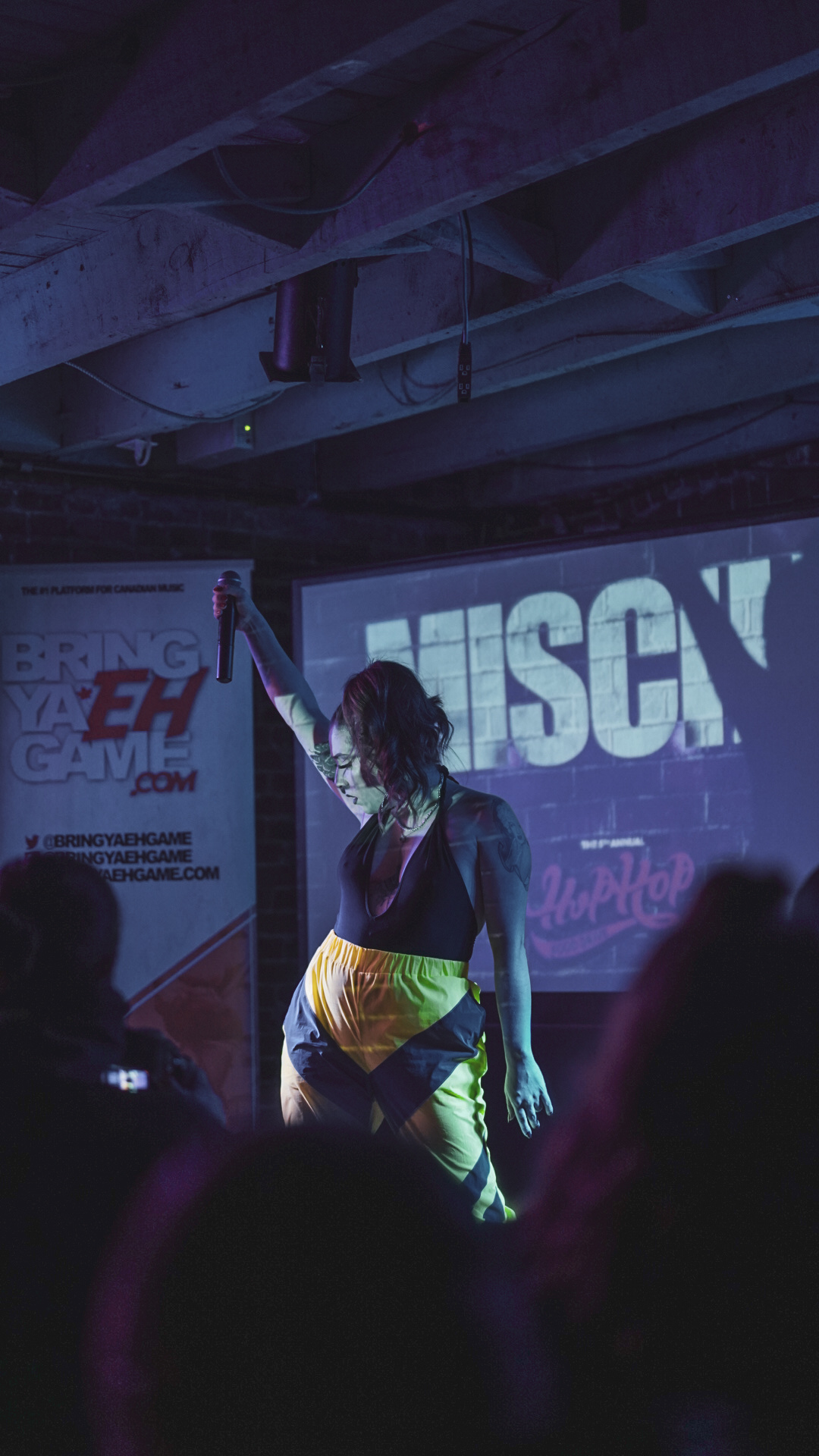Ottawa artist Michelle Plouffe took her time before deciding in 2018 that making music would be her full-time job. The 29-year-old, known by her stage name Mischa, is a triple threat: a hip hop artist who writes her own lyrics, a recording artist who writes the melodies, and a performer.
She goes a step further beyond taking the creative reins and engages fully in the business side of her work. “I act as my own manager, my own publicist and tour manager,” said Plouffe.
“You have to stay on top of everything because the same thing that worked for you even six months ago, or even three months ago, or even your last release depending on who you’re catering to with that particular song… You have to find something that works for you. And with the way that things are changing, you really have to keep on top.”
In addition to paying attention to changes in the business, Plouffe has to keep engaged with her fans, both current and potential. She said she does this to get familiar with those fans and pay attention to demographic insights to better target audiences and help her fanbase grow.
This work has only intensified since the pandemic disrupted artists’ abilities to engage with fans in person. “It’s all these little tiny pieces that make the ginormous puzzle that is the marketing aspect,” she said.
“It is exhausting. There’s so many intricate parts that make the gears spin on this. And sometimes it’s very tough to separate the business from the creative aspect, because you’re using two different parts of your brain to do each.”

Photo of Ottawa-based hip hop artist Mischa performing live. Photo by Quest.
“Spotify, Facebook, these platforms are not designed for the independent emerging artist to succeed,” said Plouffe. “Music streaming platforms really don’t pay a whole lot. They don’t. And it’s very unfortunate.”
Plouffe is one of many Canadian artists attempting to navigate the increasingly complex and sometimes opaque payment structures of today’s music industry. Where before an artist’s rights to payment were engaged through the purchase of an album, or the downloading of individual tracks, music streaming provides the listener with access to an immensely large catalogue of music for a monthly fee. The sheer volume of content translates into a much more competitive listener environment.

Alan Cross is a Canadian radio broadcaster and blogger. He said the unprecedented amount of music being shared, coupled with the fact that streaming services provide access to artists’ full back catalogues, means that today’s competition for listener’s ears is especially fierce. Photo courtesy of Alan Cross.
Alan Cross, a Canadian radio broadcaster and writer on music, explained that artists today are in an unprecedented and heightened form of competition. Cross is a long-time commentator on the Canadian music scene and industry, perhaps best known for hosting the program “The Ongoing History of New Music,” produced in Canada by Corus Entertainment and syndicated to several radio stations. He says his self-described obsession with music was ignited at six years old when his grandmother gave him a Lloyds transistor radio.
“You’re not in the olden days, when you had the record store set up the way they were. We had music magazines and video channels. Your competition was your peers, other people who are releasing new music at the same time as you,” said Cross.
“Now, everybody’s on streaming music services. So you are competing against the entire recorded music history of the human race. That’s what you’re up against. And if you don’t get streams, well, that’s why, because it’s harder than ever to gain attention to rise above the noise.”
Cross points to the fact that of the estimated 70 million songs available on streaming service Spotify, there are about 20 million that have never even been listened to once. The traditional barriers and costs for amateur creators to publish their own music have been lowered to a place where any person with a will, a laptop and a loop pedal can create their own music and share it on a streaming service for a nominal fee.
“There is too much music,” said Cross. “It’s the law of supply and demand. If there’s so much of a certain commodity, the price comes down. Even worse, the value ascribed to that commodity comes down. So today, you can get 70 million songs, any one of 70 million songs for free or something very close to it.”
“The issue now becomes for artists, what kind of reliable revenue streams can I pursue, so that I can make a living in the music business?”
Plouffe is asking herself this exact question. “You have to really adapt and understand that this is where the music industry is, but use it to your advantage to see how you can manipulate it,” she said. “I’m very much like, if you can’t beat them, join them.”

Todd Green is a professor who specializes in corporate social responsibility, and has researched ethical music consumption. Photo courtesy of Todd Green.
Todd Green, a professor at Brock University’s Goodman School of Business, focuses on another angle of the problem: the music consumer. Green conducted qualitative research on the different types of people who consume and engage with music, specifically during the time in between the heyday of illegal music downloading at the turn of the century and the ensuing decades.
Those results were published in a 2016 academic article, which also stressed the ethical implications of streaming services paying out little in the way of royalties to artists.
“There’s so many things, I will be honest, that kind of irritate me about the music consumer,” said Green. In an attempt to illustrate the rationale of this consumer, he mimicked, “Oh, this is my new favourite song, but I would have no intention of ever paying for it or supporting the artist.”
Green pointed to a new “Fundraising Pick” feature that Spotify rolled out in 2020. The feature allows artists to add a link on their Spotify profile page for listeners and fans to donate directly to the musician. Spotify frames the feature this way: “First and foremost, this feature enables artists who are interested in raising money to support themselves, their bands, or their crews, to get the word out to their fans on their Spotify artist profiles.”
“I feel like it’s sort of like the tip jar at a pub or a bar instead of paying musicians for their experience,” said Green. “It’s like, ‘Well, if you’re so inclined, here’s my hat. And you can put some coins in here.’ It seems so demeaning that artists have to almost beg to be valued financially for what they do.”
Green said that a huge mindset has to change among consumers about the value that music brings to their lives. “It’s weird when consumers suggested that they’re being ethical by paying for music. I’m like, ‘What? Like, do you think you’re ethical because you stop at a stop sign, or because you pay for your groceries? No. So why do you think you’re ethical for paying for music?’”
He noted the irony that consumers can hold such a strong personal and emotional connection with music artists and their work, while at the same time being reticent to assign it a high dollar amount. “It’s such a weird mindset amongst consumers to value it so much emotionally and socially, and then not think that they should have to pay a fair price for it.”
Green said that for the music industry to begin to pay music artists fairly for their work, it starts with a major shift in consumer behaviour and how listeners value music.
Fauteux said that looking at streaming services as the sole culprits behind the pittance paid out to artists would be missing the full picture. “That’s a record label problem, too,” he said. “The royalty rate is decided as well by the labels. And part of that is the ongoing power that record labels have. It’s not just a Spotify problem.”